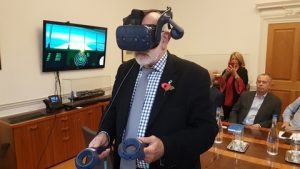Virtual Reality Finnish Disruptive Innovation transforms Maritime Safety Training and Education.
London. Allaboutshipping.co uk was invited on October 29, 2019 to attend a presentation of the MarSEVR (Maritime Safety Education with Virtual Reality) in London at the premises of LOMAR, a global and leading maritime company – see our mentioning in our last night’s recap.
As shipping evolves in a new era, advanced but simple educational instruments and programmes is a must to enhance maritime safety and the protection of crew, ships, cargoes and the environment all over Planet Ocean. Maritime Education and Training is the A to Z in modern shipping and shipping companies, particularly shipmanagement groups but also regulators must adopt same as part of the ISM – International Safety Management, ISPS – The International Ship and Port Facility Security Code and STCW – The International Convention on Standards of Training, Certification and Watchkeeping for Seafarers. Above all, the Marine Insurance sector in its entirety will immensely benefit from this innovative technology and reduce the losses and damages by million of dollars; and that’s what counts most!
The presentation demonstrated MarSEVR, a prototype of a maritime VR training technology which can be utilized to train both trainees and professionals, and was delivered by Professor Dr. Eng. Evangelos Markopoulos from HULT International Business School (U.K) and Fellow of the Turku University of Applied Sciences (TUAS) Research Group of Futuristic Interactive Technologies (Finland), by Associate Professor Dr. Eng. Mika Luimula and Director of the Turku Game Lab (Finland), and by Mr. Panagiotis (Panos) Markopoulos, Virtual Reality and Augmented Reality (VR/AR) Games Designer/Developer and Technical Artist from the University of Arts London (UAL).
Compared to traditional command bridge simulators, the MarSEVR developers had no limitations while designing the learning content. The technology adopts the same design principles as in the game industry to implement, immersive training scenarios that assure the engagement of the user to understand the right decision making factors in a gamified environment.
The technology has been developed tov handle unlimited maritime safety applications and scenarios. The goal of the first training application presented was to practice situation awareness and decision making by replicating a ship bridge environment and then by creating different training scenarios with different difficulty levels. The specific MarSEVR application focuses on watch change between two navigation officers on a cargo ships bridge and on events happening after the watch change. The object is to train the user’s readiness to plan and execute navigational obligations, collision avoidance, be observant of equipment status and settings and to take actions and catching errors early before they get out of control.
Compared to the traditional simulator the MarSEVR objectives are to bring the training method to the ship and offer the pedagogical supports and learning analytics in form of instant feedback. This gives opportunity to practice anytime and anywhere. The learning goals of training are the understanding the instructions, the use and checkup of the main technologies, and a solid base of visual route and traffic information for the safe navigation. The training experience must be realistic, especially on touch-feel side. The virtual training replicates the real-life situation authentically.
In the first demonstration version of MarSEVR, all behavioral data are stored locally and are anonymous. At a later stage a backend system will be build including learning analytics and dashboard services for administrators in order to detect possible challenges in safety issues. MarSEVR intends to integrate data analytics and machine learning technologies that will evolve the existing it into a gamified Artificial Intelligence VR training technology on maritime safety.
MarSEVR allows VR training in diverse areas to train amateur but also qualified and certified personnel. The trainee practices with virtually digital equipment that incorporate the same features of the real operations environments, machines and tools. MarSEVR is fully parametrical allowing the users to change functional (technical, operational, etc) and nonfunctional (temperatures, weather, etc) conditions and requirements. on regular or emergency situations.
MarSEVR research is led by Professor Dr. Eng. Evangelos Markopoulos from Turku University of Applied Sciences (TUAS) and Assoc Prof. Dr. Eng. Mika Luimula (TUAS) and supported by Mrs Jenny Lauronen and Mrs Pihla Lehto from Aboa Mare, a Maritime Academy at Novia University of Applied Sciences, Mr. Panagiotis (Panos) Markopoulos from the University of Arts London (UAL), and Mr. Sami Laukkanen (TUAS).






